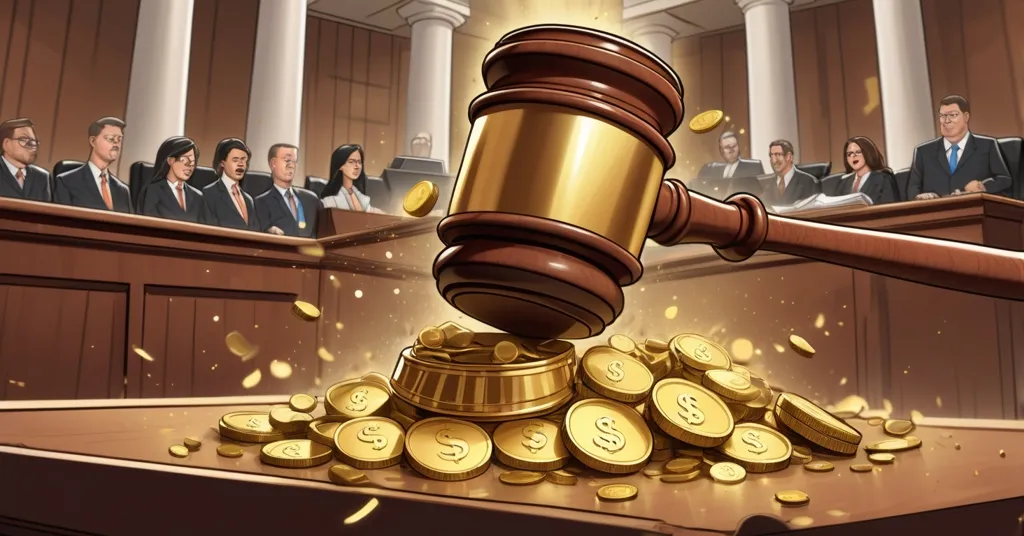Metaplex Faces Legal Heat Over $7.3M in Unclaimed SOL: What’s Next?

Solana NFT Platform Metaplex Faces Legal Scrutiny Over Unclaimed SOL
Metaplex, a prominent platform on the Solana blockchain for managing NFTs, is under fire for its plan to sweep over 54,000 unclaimed SOL into its community-managed fund, potentially stirring up a legal storm.
- Metaplex plans to transfer unclaimed SOL into its DAO treasury
- Value of SOL at $7.3 million
- Users have until Apr. 25, 2025, to reclaim funds
- Burwick Law threatens legal action
- Alternative proposal to refund NFT holders directly
The Controversy
In a move that’s shaking the foundations of the Solana ecosystem, Metaplex is facing a legal showdown over $7.3 million in unclaimed SOL. This SOL became available following a technical upgrade on the Solana blockchain that allowed for the resizing of NFT metadata accounts, essentially freeing up SOL that had been used to pay “rent” for these accounts to live on-chain. Metaplex, founded in 2021 and a key player in the burgeoning Solana NFT space, decided to transfer these unclaimed funds into its decentralized autonomous organization (DAO) treasury, which is essentially a community-managed fund controlled by token holders.
However, not everyone is on board with this plan. Burwick Law, a New York-based firm known for its focus on crypto-related legal issues, has raised serious concerns. They argue that Metaplex’s move could violate consumer protection laws and erode trust within the Solana community. In a scathing critique, they stated:
“Rent was paid so NFTs could live on-chain, not to bankroll a future windfall.”
The law firm suggests that Metaplex should halt the transfer and issue refunds directly to current NFT holders, with the DAO potentially retaining up to 10% for network maintenance. This controversy comes at a time when the NFT market has experienced significant volatility, including a 60% drop in trading volumes in February and security breaches like Bybit’s, highlighting the fragility of trust within the crypto ecosystem.
Legal Implications
The potential legal implications of Metaplex’s plan are significant. Burwick Law warns of possible claims of unjust enrichment and unauthorized fee collection, drawing parallels to lawsuits against traditional banks over undisclosed fees. Their recent involvement in a class-action lawsuit against the team behind the LIBRA token for deceptive practices and insider trading during its launch underscores their commitment to holding crypto entities accountable.
Burwick Law’s concerns are not unfounded, considering the broader regulatory landscape for cryptocurrencies remains uncertain. The EU’s Markets in Crypto-Assets (MiCA) regulation and the U.S. SEC’s actions against crypto firms highlight the evolving legal framework. In contrast, clearer guidelines in places like Singapore and Hong Kong could serve as a benchmark for Metaplex’s response.
Community Reaction
The community’s response has been mixed. Some argue that Metaplex’s plan is about as subtle as a whale in a fishbowl, suggesting a lack of transparency that could undermine user trust. Others see the potential benefits of the DAO using these funds for ongoing development and to benefit the broader community. John Doe, a Solana NFT holder, expressed his frustration, saying:
“I paid for my NFTs, not to fund Metaplex’s treasury.”
While Metaplex’s intentions might be to support network growth, the move smacks of a classic case of ‘finders keepers’ in the crypto world, raising questions about the governance of decentralized platforms and their responsibility to users.
Regulatory Context
This controversy is part of a larger trend of legal scrutiny within the NFT sector. Recent legal actions, such as Watch Skins Corporation’s lawsuit against LVMH, illustrate the growing number of challenges facing the industry. The lack of user protection mechanisms in the crypto space, such as deposit insurance and anti-fraud measures, further complicates the situation. Metaplex’s handling of unclaimed SOL is not just a legal issue but a litmus test for the governance of decentralized platforms and their impact on user trust and the broader perception of the Solana ecosystem.
Future Implications
As the drama unfolds, the case of Metaplex’s unclaimed SOL could set a precedent for how decentralized platforms handle unclaimed assets. This situation underscores the need for transparent and fair practices to maintain user confidence. The outcome could influence future governance models and the handling of unclaimed funds across various blockchain platforms. Keep an eye on this space to see how it might impact the future of crypto governance.
Key Questions and Takeaways
- What is Metaplex planning to do with the unclaimed SOL?
Metaplex plans to transfer over 54,000 unclaimed SOL, valued at about $7.3 million, into its community-managed fund.
- What is the deadline for users to reclaim their unclaimed SOL?
Users have until Apr. 25, 2025, to manually reclaim these funds.
- Why is Burwick Law concerned about Metaplex’s plan?
Burwick Law is concerned because the move could violate consumer protection laws and undermine trust within the Solana ecosystem due to a lack of transparency.
- What alternative does Burwick Law suggest for handling the unclaimed SOL?
Burwick Law suggests halting the transfer and issuing refunds directly to current NFT holders, with the DAO retaining up to 10% for network maintenance.
- Has Metaplex responded to Burwick Law’s concerns?
As of now, Metaplex has not publicly responded to the letter from Burwick Law.
- What is the potential legal impact of Metaplex’s plan?
The plan could lead to legal action for unjust enrichment or unauthorized fee collection, similar to cases involving banks and overdraft charges.
- What previous legal action has Burwick Law taken?
Burwick Law recently filed a class action lawsuit against the team behind the LIBRA token, alleging deceptive practices and insider trading during its launch.



